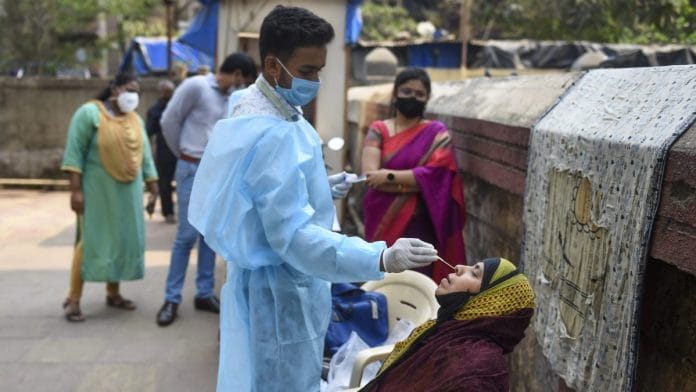New Delhi: A new study by scientists at the Indian Institute of Science (IISc) suggests the Covid-19 virus is now mutating much faster than before.
While the national average is about 8.4 mutations per sample, the study found that three isolates or viral samples from Bengaluru had 27 mutations in their genomes with over 11 mutations per sample.
This is even more than the global average of 7.3, according to researchers.
The study, published in the Journal of Proteome Research, identified multiple mutations and unique proteins in isolates of SARS-CoV-2.
With the Covid-19 pandemic raging for over a year, novel strains or genetic variants of the virus have begun to evolve around the world.
To better understand how the virus is mutating, the IISc team carried out a comprehensive “proteo-genomic” investigation — a series of analyses of SARS-CoV-2 samples recovered from nasal secretions of Covid-positive individuals in Bengaluru.
The genomic analysis was done using next generation sequencing (NGS), a technology that allows for rapid sequencing of the entire genome.
According to the team led by Utpal Tatu, a professor at IISc, sequencing the genomes of viral strains from around the world is important because it helps keep track of mutations that are arising constantly.
Variants circulating in India have multiple origins
The IISc team found that the Bengaluru samples are most closely related to the viral samples from Bangladesh. It also showed that the variants circulating in India have multiple origins rather than having evolved from a single variant.
The genome encodes ‘instructions’ to produce the proteins that allow an organism to function. According to the IISc team, the SARS-CoV-2 genome codes for more than 25 proteins but only a handful of these proteins have been identified so far.
“Studying viral proteins provides functional information which is currently not well represented,” Tatu said in a statement.
The team detected 13 different proteins — most of them previously unidentified — from clinical samples. One protein called Orf9b, which suppresses the host’s immune response, had been predicted, but the IISc team provided the first evidence of its expression.
“Just knowing how the virus functions will not be enough. We need to put it in the context of the host,” Tatu said.
The team thus explored how the human body responds to the virus by examining host proteins. They discovered as many as 441 proteins unique to Covid-positive patients, many of which are speculated to play a key role in the body’s immune response.
Also read: Indian scientists create new computational tool to track Covid-19 mutations worldwide







The so called study have made a mockery of themselves. They predicted doomsday in India due to Covid. But nothing of that sort happened.